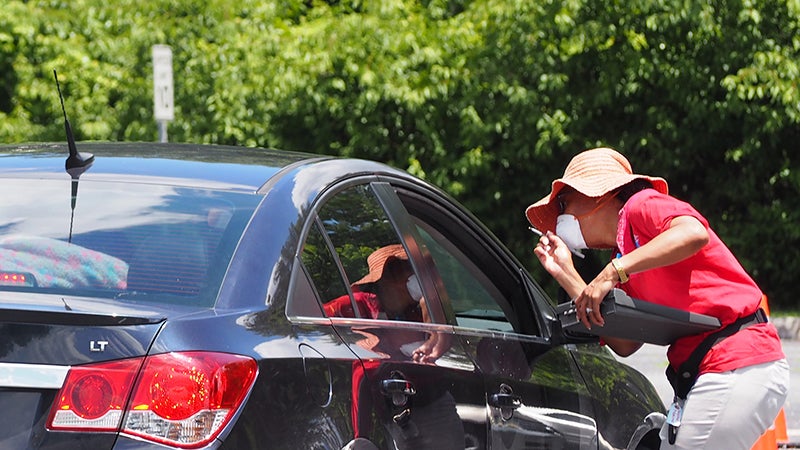State officials urging vaccines, vigilance
Published 8:23 pm Monday, April 19, 2021
As Virginia enters Phase 2 of its vaccination campaign and more than three million more state residents are now eligible for a COVID-19 vaccine, Gov. Ralph Northam and state health officials are urging those who have yet to receive one to get one.
“Our message is simple,” Northam said. “If you’re an adult, you should get a shot. If you’re older, you should get a shot. If you’re in your 20s or 30s, you can get COVID too (and) you should get a shot.”
Anyone 16 and up in Virginia is eligible to receive a vaccine, and Northam said anyone who wants a shot should be able to get one by the end of May. Those wanting one can sign up on virginia.vaccinate.gov.
More than 3.4 million people in Virginia, nearly 40% of the state’s population, have received at least one dose of a COVID-19 vaccine, according to Virginia Department of Health data reported April 19, and more than 2.1 million people, or 25%, have been fully vaccinated.
In Suffolk, 47,131 vaccine doses have been administered — 29,436 who have received at least one dose, and 18,217 who are fully vaccinated. In Isle of Wight County, 14,760 people have received at least one vaccine dose, and 9,929 people have been fully vaccinated. Among Southampton County residents, 5,701 people have received at least one dose of the vaccine, and 3,676 people have been fully vaccinated. In Franklin, 2,840 people have received at least one vaccine dose, and 1,855 people have been fully vaccinated.
“However you’re able to get an appointment, please get vaccinated,” Northam said. “It will keep you safer. It will keep your family safer. And it will keep your community safe. Vaccinations are the only way we can end this pandemic and get back to normal.”
Northam cautioned that not everyone will be able to get a vaccine appointment immediately.
“Not everyone can get a shot today, or even this week,” Northam said. “And while demand still outstrips supply, the supply is much larger than it used to be.”
Northam said the allotment of Pfizer BioNTech and Moderna vaccines will allow the state to “comfortably” vaccinate any adult who wants a vaccine by mid-to-late May, and after that, the state would focus on getting children vaccinated. He said that with about 8.5 million residents — 2 million to 2.5 million of them children — the state will need to have 70% to 75% of residents vaccinated to reach herd immunity, which he doesn’t expect to happen until the beginning of next year.
However, in numerous parts of the state, many vaccine doses are going unordered — about 40,000 in the past week — and are being shifted to areas with more demand, such as the Northern Virginia, Charlottesville and Richmond areas.
“I think one of the things that was really, really surprising in the rollout of this vaccination effort was how quickly demand has dropped off in different parts of the state,” said state vaccine coordinator Dr. Danny Avula. “We knew that there was going to be a difference in the demand in places like Northern Virginia versus more rural Virginia, but it’s been pretty stark, and I think, actually, that probably describes the next phase of our work, really figuring out how do we get to those places of low demand, and do the hard work to increase access and to help people understand why they should still be vaccinated.”
Though the state’s percent-positivity is down to 6.1% — in the Western Tidewater Health District it is 8.3% — daily case counts have plateaued, and Northam, Avula and other health officials are calling for vigilance against the virus, especially as COVID-19 variants are an increasing presence among positive cases. Two cases of the P.1 variant of COVID-19 have been identified by the state department of health, including one in the Eastern Region where there was no clear travel history.
“I think that is just further evidence that these variants are circulating,” Avula said.
The B.1.1.7 United Kingdom variant currently makes up 44% of new cases across the United States, but Avula said the state lab is doing genome sequencing of just 15% of positive COVID-19 cases — about 150 to 200 cases daily. He said new federal money is being directed to increase its capacity, and it is working with other academics also institutions and their labs to increase variant surveillance capabilities.
The Centers for Disease Control and Prevention is also contracting with LabCorp and Quest Diagnostics to add genomic sequencing capabilities. Avula expects the state’s genomic sequencing to “expand significantly” in the next few weeks and provide clarity on how much the variants are circulating in the state.
“We do need to increase the amount of genetic surveillance that we’re doing here in Virginia,” Avula said, “so we can get a better sense of what’s happening here in the state.”
“The reason that we need people to get vaccinated is because we’ll never get to herd immunity if we don’t get shots in arms,” Northam said. “This virus is smart. It needs vectors like us to live. And if there are vectors out there, it will live and it will also mutate, and it will become more of a challenge regarding vaccinations.”


